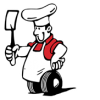Per the Ohio Uniform Food Safety Code, the following food handling procedures must be followed when receiving ready-to-eat food that will be served to the public.
- Bare hand contact of ready-to-eat food is prohibited. Single use gloves, tongs, deli tissue, or other barrier are required to prevent contamination from bare hands.
- Hot foods must be received and held at 140 degrees F or above.
- Cold foods must be received and held at 41 degrees F or below.
- Use a metal stem thermometer to monitor internal food temperatures every 2 hours.
- Cool hot foods quickly. Food is required to be cooled from 140 degrees F to 70 degrees F in 2 hours or less and from 70 degrees F to 41 degrees F in 4 hours or less.
- Reheat all potentially hazardous foods to at least 165 degrees F in 2 hours or less.
- A cooler may be used for short term (a few hours) refrigeration only. Mechanical refrigeration must be used for storing foods overnight or longer.
By following these simple procedures you will help prevent foodborne illness. The Centers for Disease Control report that most foodborne illness is the result of cooking, cooling and holding food at inadequate temperatures. Foodborne illness can be a serious condition for individuals with weakened immune systems.
This information has been provided by the Fulton County Health Department. 419-335-0915.





